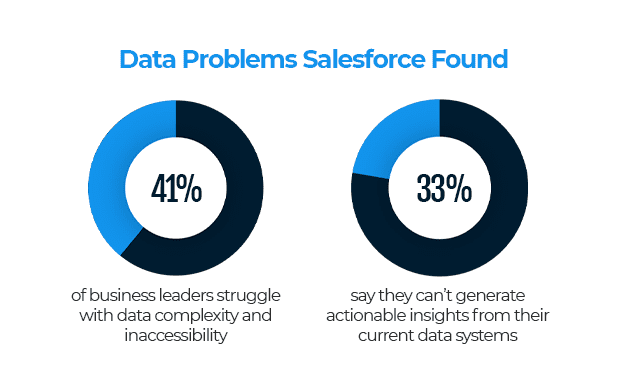
Consumer data problems—whether siloed, outdated, inaccurate, or inaccessible—are costing companies millions each year. And while the financial impact is staggering, the strategic damage is even worse: failed AI initiatives, missed opportunities, and decisions based on flawed insights.
So, what’s the real cost of data problems? Let’s break it down.
The Financial Drain: What the Numbers Say
Consumer data problems aren’t just a nuisance—they’re a multi-million-dollar problem.
$12.9M/year
The average cost of siloed data per organization (Gartner)
12 hours/week
Time knowledge workers spend searching for data (Forrester)
$9.36M
Average cost of a U.S. data breach (IBM)
47%
of CXOs say data readiness is the top AI barrier (Accenture)
41%
struggle with complexity, 33% can’t generate insights (Salesforce)
And that’s just the hard costs. The soft costs—missed opportunities, slow innovation, and declining customer trust—are harder to quantify but equally damaging.
Operational Impact: Where Consumer Data Problems Hurt the Most
- Sales: Reps waste time chasing the wrong leads
- Marketing: Targeting is off due to outdated or duplicate data
- Customer Service: Poor service from incomplete profiles
- Finance: Forecasts based on unreliable reports
This cross-functional drag makes data readiness not just an IT concern—but a business-wide priority.
Time Lost Is Money Lost
If each team member wastes 12 hours a week looking for the right data, that’s hundreds of hours a month in lost productivity. Multiply that across departments, and the cost skyrockets.
Now layer in the time lost trying to clean problematic data or reconcile conflicting reports. You’re not just wasting hours—you’re eroding confidence in your systems and insights.
The AI Roadblock No One Talks About
Everyone wants to talk about AI and machine learning. But here’s the truth: 47% of CXOs cite lack of data readiness as their top barrier to implementing generative AI, according to Accenture.
It’s not that your AI models aren’t good enough. It’s that your consumer data isn’t ready. If your inputs are inconsistent, unstructured, or fragmented, your AI tools will produce unreliable outputs—or fail entirely.
Missed Insights, Slower Growth
Salesforce found that 41% of business leaders struggle with data complexity and inaccessibility, and 33% say they can’t generate actionable insights from their current data systems.

When teams can’t access clean, unified consumer data in real time, decision-making slows, marketing campaigns underperform, and business growth stalls.
Compliance, Risk, and Privacy
Poor data management doesn’t just reduce efficiency—it increases risk.
- Regulations like GDPR, HIPAA, and CCPA demand secure, governed data
- Fragmented systems weaken oversight, exposing your organization to security threats and legal risk
- When trust is lost, so is customer loyalty
IBM’s estimated $9.4M average cost of a data breach highlights the stakes of poor governance.
Where Readiness Breaks Down: The Consumer Data Lifecycle
Readiness can fail at any stage:
- Collection: Inconsistent formats and unreliable sources
- Storage: Siloed systems and limited visibility
- Access: No unified data catalog or governance controls
- Activation: Poor integration with analytics, BI, and marketing tools
Understanding the full lifecycle reveals where your efforts need to focus.
The Root of the Problem: Data Readiness
Most companies don’t have a clear view of their consumer data:
- Where their data lives
- Whether it’s clean and complete
- Who owns it
- How it flows across systems
This lack of readiness makes it nearly impossible to scale analytics, implement AI, or operate with confidence.
The Fix: Start With a Data Readiness Audit
Before you invest in new tools or launch that next big initiative, ask yourself: Is our data ready? At Data Decisions Group, we help organizations assess their consumer data landscape, identify the biggest gaps, and create a plan to clean, connect, and activate their data across the enterprise.
What You'll Learn in a Readiness Audit:
- Where siloed data is costing you
- How to reduce data prep time by 50%+
- How to prepare your data for AI and analytics
- Which quick wins can immediately impact performance
Final Thoughts: Don’t Let Data Problems Block Big Decisions
You don’t need more data—you need better consumer data. By addressing data readiness now, you can reduce waste, eliminate risk, and finally turn your data into the asset it was meant to be.
Ready to stop wasting money on consumer data problems?
and start making smarter, faster decisions today.
